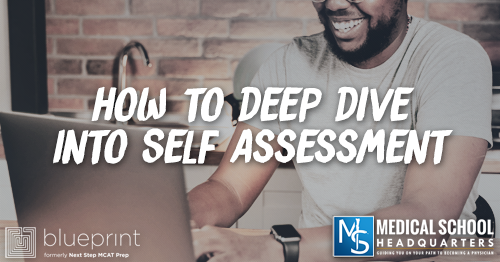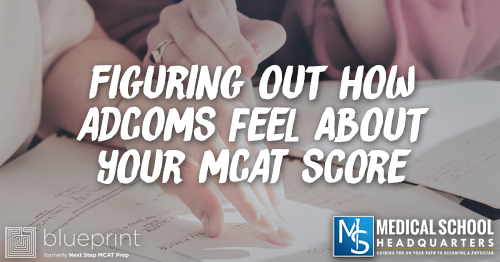Apple Podcasts | Google Podcasts
Session 243
I’m joined by Alex from Blueprint MCAT to discuss the 2022 medical school application cycle. Plus, what should you expect from the MCAT next year!
We’re joined by Armin from Blueprint MCAT. If you would like to follow along on YouTube, go to premed.tv.
Listen to this podcast episode with the player above, or keep reading for the highlights and takeaway points.
[03:20] New COVID-Related Secondary Prompts
Alex took the MCAT just before the pandemic so he was fortunate enough to not be affected. And he thinks the changes to the MCAT and to the application cycle right now are really interesting.
One of the changes he noticed is in the secondaries where the prompt asks about how is your experience affected by COVID?
And every medical school approaches this prompt slightly differently, for example:
- What experiences did you have planned that were canceled?
- How did COVID affect you personally?
- How did COVID impact your conception of the healthcare system or society as a whole?
At the start of the pandemic, health care professionals are being viewed as heroes. And now, they’re villainized for trying to save people. And so, there’s just this weird shift of public perception among a certain subset of people. Hopefully, this anti-science craziness that we’re in will pass and medicine will be medicine, and you’ll work as a physician.
Personally, I don’t know what they’re trying to get into with the questioning from these medical schools. And Alex thinks medical schools probably want to see the applicant’s views on the structure of healthcare delivery. They want medical students who can think thoughtfully and caringly, and sympathetically about what that means in the bigger picture, and possibly, identify areas of future change.
[10:54] Is the Fauci Effect Real?
The “Fauci Effect” is the terminology relating to the increase in the number of applicants to medical school for the application cycle 2020-2021. And this was attributed to the impact of Dr. Anthony Fauci on his COVID response.
People are saying, they’ve pushed epidemiology and healthcare delivery to the forefront of everyone’s mind so they’re going to be applying to medical school.
Alex thinks this is a very powerful idea. And once you put it into somebody’s mind, it becomes very easy to spread. In fact, it has almost become a meme within certain premed circles. But Alex really didn’t find this concept to be compelling because deciding to take medicine doesn’t just happen overnight.
'I'm going to apply to medical school. And it's because of Dr. Fauci. And we all know that that doesn't happen.'Click To TweetIs it going to be more competitive this application cycle? Are there going to be more people that are applying? And so to really look forward to the next cycle, we have to look back and talk about the Fauci effect to see if there’s anything to it.
[13:42] The Reason for Increased Applications
Of course, the AAMC is excited about trying to promote more people to want to go to medical school because they get more money. And there’s 18% more applicants – not applications. Because each applicant can obviously increase the number of applications they’re submitting. But who are these people? And they don’t really tell us.
According to an NPR article, Stanford saw a 50% jump in the number of applications. And that’s because they said the MCAT was optional. Stanford was one of the first big names out there that made the MCAT optional. And so, they’re obviously going to see more applications and more applicants because they made it optional.
'We've seen when we have recessions, and depressions and traumatic stuff like 911, people always fall back on education to help propel them forward in life through tough times.'Click To Tweet[17:52] Should You Take the MCAT?
Alex thinks this is a nuanced question that depends on your particular background. In general, you should take the MCAT to apply to medical school. There are some schools that have gone MCAT optional or MCAT blind. And so, you can go to medical school without having taken the MCAT. But the vast majority of applicants say taking the MCAT is the right decision.
The average number of schools that students apply to is around 17 for MD schools and 9 for DO schools. Of course, this depends on your time and money. It’s really hard to go to medical school.
Ultimately, you want to maximize your chances of becoming a physician. And there are not too many MCAT-optional schools in the country. Hence, this is the reason Alex thinks why you should take the MCAT.
[23:35] Is MCAT Going to Be Online?
The AAMC said that the MCAT can’t do online exams. Alex thinks the AAMC very often is a black box in terms of the actions that they take. And so, it’s very difficult to gain any kind of insight as to what’s happening on the inside. He adds that if there was ever a time where it was going to happen, it would have been last year.
[25:31] Change in Testing Length
The MCAT also changed in length from this seven-and-a-half-hour test to a five-hour test. They did it to fit more people in the testing centers and have three tests a day instead of one test a day.
“The AAMC's job is to provide a standardized testing experience and last year was an unprecedented anomaly.”Click To TweetAnd now that they’ve returned to the standard testing length, we’re probably not going to see them shorten it again.
They’ve appropriately addressed those concerns by shifting the test timings since you can take it at two times.
This can be disappointing, especially for people who are needing to travel five, or six hours or flying somewhere to be able to take the exam because their local testing centers are closed or full.
I’m actually in the middle of reading a book called Why We Sleep by Matthew Walker. And I realized that if you can prevent at all costs needing to travel for the MCAT, then do it.
The book talks about research about sleeping in hotel rooms, and our body is built to protect us. It knows that you’re in a new sleeping environment. And it will not let you get into as deep of a sleep as you normally would at home if you’re sleeping in a hotel room.
[30:11] Worried About Not Getting Shadowing or Clinical Experience
Alex mentions it’s always worth emphasizing that this is not an algorithm that decides the med school class.
'Everyone who makes these admissions calls and decisions, they are real people who want to build the best possible matriculated class that they possibly can.'Click To TweetWhen you’re applying, it can feel quite impersonal. But ultimately, this is a situation that everyone applying has gone through. Every single admissions committee member in every single medical school in the country will be aware of this because it affects everyone, including them personally.
The medical schools themselves had to deal with this problem too. Obviously, the directors of admissions are aware of the problem and are adjusting so don’t worry because they understand.
Watch this Inside Med Admissions episode and listen to what admissions committees think about the application cycle during these COVID times!
[34:25] Should You Be Worried About the Changes Coming?
'Applying to medical school has always been hard, it will always be hard.'Click To TweetThe 2020 bump, this so-called Fauci Effect, was due to mostly very rushed applications of people trying to take advantage of a lack of MCAT that ultimately didn’t pan out. That was just a lot of extra revenue for the AAMC and maybe secondary essay revenue for medical schools.
It’s not going to be more competitive, it’s just going to be the way it is. People still need to do well in their classes, their MCAT, and everything else.
I think that the potential silver lining is that medical schools may lower a lot of what they’ve been looking for and may look holistically. And this would be good for students who have always had a hard time finding shadowing and clinical experience. Or those coming from minority or disadvantaged backgrounds. Those who don’t have mommy or daddy as doctors or don’t have all their neighbors as doctors.
Another silver lining is the virtual interviews and it’s more likely here to stay. From an interviewer’s standpoint, it allows for flexibility. So they can fit it into their schedule easier. Then from a student’s standpoint, it relieves them of the financial burden of the costs associated with travel, accommodation, and more.
Ultimately, focus on what you can do and what will help you stand out from an application standpoint. Keep pushing forward and don’t stress the small things. Don’t worry about how each individual medical school is going to handle lack of shadowing and lack of clinical experience, etc.
[40:34] Get Notified for MCAT Booking Dates
Alex also wishes to tell everyone that medical schools want to fill their medical school class with engaged, interesting, and passionate people.
And if you haven’t taken your MCAT yet, and you’re planning to take it in January, Alex highly recommends going to their email mailing list alert. They will email you as soon as booking dates are announced.
'Booking MCAT dates depending on where you live has always been difficult.'Click To TweetA lot of students, including Alex, got burned by studying for weeks and months in advance only to find out the test center close to their place is all booked out. So they end up not taking the test.
And so, get on that mailing list, fill out the link, put in your email address, and be notified for January test dates. They will open bookings in approximately mid-October. Follow the @AAMC_MCAT on Twitter. If you don’t have Twitter, download it and make an account just for this purpose.
[46:57] Get Help From Blueprint MCAT
Sign up for an account at Blueprint MCAT and join their live online course. It’s a 16-lesson series of two and a half hours each. Learn the different test-taking strategies and how to approach questions strategically. But ultimately, you have the opportunity to get 30 plus hours of listening to how instructors deduce questions.
Links:
Why We Sleep by Matthew Walker
Inside Med Admissions: Listen to what admissions committees think about the application cycle during these COVID times!
Twitter: @AAMC_MCAT
SEARCH SITE
SEARCH SITE
LISTEN FOR FREE












